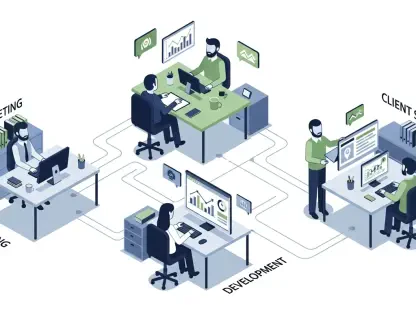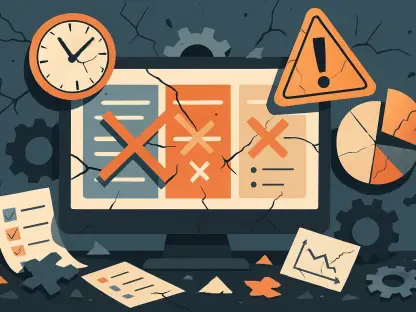What happens when a policy designed to shield domestic industries ends up costing companies their hard-earned sustainability progress, and how do these trade barriers unravel the Environmental, Social, and Governance (ESG) commitments of corporations worldwide? Tariffs, taxes on imported goods, have surged as a tool to boost local economies, yet they’re creating significant challenges for businesses striving to maintain ethical and environmental standards. Picture a multinational firm, meticulously building a supply chain to cut carbon emissions, only to face skyrocketing costs and logistical nightmares due to sudden trade barriers. This clash between economic policy and ethical goals is not just a financial headache—it’s a profound challenge to the very principles many businesses stand for. Dive into the hidden battle between tariffs and corporate responsibility, where supply chains and sustainability hang in the balance.
Why Tariffs Clash with Corporate Sustainability
The tension between tariffs and ESG initiatives is more than a niche issue; it’s a defining struggle for modern businesses. With consumers and investors increasingly prioritizing climate action and ethical practices, companies have embedded sustainability into their core strategies. However, tariffs disrupt this focus by inflating costs and creating supply chain uncertainty, often forcing executives to prioritize short-term survival over long-term green goals. This conflict matters because it threatens to derail global progress on pressing issues like carbon reduction and fair labor standards, impacting not just individual firms but entire industries striving for a better future.
The stakes are high as businesses navigate this turbulent landscape. A 2023 study by McKinsey found that 70% of companies with strong ESG programs report better financial performance, yet economic pressures from tariffs can divert resources away from these initiatives. When the cost of imported materials spikes, funding for renewable energy projects or ethical sourcing often takes a backseat. This dynamic reveals a critical fault line in global trade policy, where protectionism can inadvertently undermine the very innovation it aims to foster.
Economic Fallout: How Tariffs Derail ESG Efforts
Tariffs hit companies where it hurts most: their bottom line. By increasing the price of imported goods, these taxes strain budgets, compelling firms to redirect funds from sustainability programs to cover immediate expenses. Adam Freedgood, a principal client director at Third Partners, describes tariffs as a “huge distraction” for leadership teams, pulling attention away from strategic ESG goals toward firefighting operational costs. This economic burden often means that initiatives like reducing emissions or improving supplier labor conditions are delayed or scaled back.
Beyond financial strain, the unpredictability of tariffs creates a ripple effect across global operations. Companies reliant on imports from targeted regions, such as China, face sudden price hikes that disrupt long-term planning. For instance, a tech manufacturer aiming to source eco-friendly components may be forced to switch to cheaper, less sustainable alternatives just to stay competitive. This short-term pivot can unravel years of progress toward greener practices, highlighting how trade policies can clash with environmental commitments.
Supply Chain Chaos in the Wake of Trade Barriers
The impact of tariffs extends deep into supply chain networks, introducing volatility that complicates ESG compliance. When trade taxes target specific countries, businesses must scramble to find new suppliers, often in regions with less stringent environmental or social standards. This reshuffling makes it nearly impossible to maintain consistent oversight of sustainability metrics across the supply chain, as companies struggle to vet new partners under tight deadlines. The result is a fractured system where ethical goals become secondary to logistical survival.
A real-world example underscores this challenge. Firms sourcing leather from South America have had to map intricate supply chains to combat deforestation risks, a process that becomes exponentially harder when tariffs force sudden supplier changes. John Boyd, principal at the Boyd Company, notes that while reshoring or near-shoring to places like Latin America can bypass some tariff costs, it often disrupts established ESG monitoring systems. This instability shows how trade policies can turn supply chain management into a high-stakes balancing act.
Expert Perspectives on Navigating the Tariff-ESG Conflict
Industry voices shed light on the nuanced challenges tariffs pose to corporate responsibility. Freedgood emphasizes that in the U.S., ESG remains largely business-driven, lacking federal mandates to shield it from economic disruptions like tariffs. Without policy support, companies are left vulnerable, often deprioritizing sustainability when faced with trade-induced financial pressures. His insight points to a systemic gap where government action could play a pivotal role in aligning trade and ethical objectives.
Meanwhile, Jay Ruckelshaus, president and co-founder of Gravity, highlights a shift in how firms view ESG amid tariff uncertainty. He observes a growing demand for sustainability initiatives to deliver measurable outcomes—think cost savings or access to capital—rather than just meeting compliance standards. Adding to this, Boyd cites cases where companies have relocated operations to tariff-friendly regions, like Latin American countries, creating opportunities but also new hurdles in maintaining global ESG consistency. These perspectives collectively paint a picture of an evolving corporate landscape, forced to adapt under duress.
Strategies to Weather the Tariff Storm
Despite the obstacles, businesses can adopt practical measures to protect their ESG ambitions while managing tariff impacts. One key approach is comprehensive supply chain mapping, which offers visibility into every link of the network. By using technology to track suppliers and assess risks—whether environmental or social—companies can preempt disruptions and uphold sustainability standards. This method ensures that even under trade policy shifts, ethical commitments aren’t sacrificed for expediency.
Another vital strategy involves leveraging advanced tools under the guidance of Chief Information Officers (CIOs). Freedgood suggests that Artificial Intelligence can transform supply chain resilience, offering predictive analytics to foresee tariff-related risks and optimize material flows. Additionally, redefining ESG initiatives to emphasize financial returns, such as waste reduction for cost efficiency, helps justify investments during economic strain. Exploring reshoring options with expert consultation can also balance economic benefits with sustainability goals, ensuring a holistic approach to navigating this complex terrain.
Reflecting on the Path Forward
Looking back, the struggle between tariffs and corporate ESG goals revealed a profound tension in global business dynamics. The economic pressures and supply chain disruptions forced many companies to rethink their priorities, often at the expense of sustainability. Yet, amidst these challenges, innovative strategies emerged, from technology-driven solutions to pragmatic shifts in ESG focus, showcasing corporate resilience.
Moving ahead, businesses must commit to integrating supply chain transparency and technological innovation into their core operations. Partnering with experts to assess reshoring impacts and aligning sustainability with financial outcomes can turn obstacles into opportunities. As the landscape of trade policy continues to evolve, the lessons learned should guide firms toward a future where economic and ethical goals coexist, ensuring that progress in sustainability withstands the storms of global trade.









